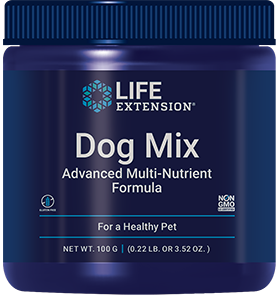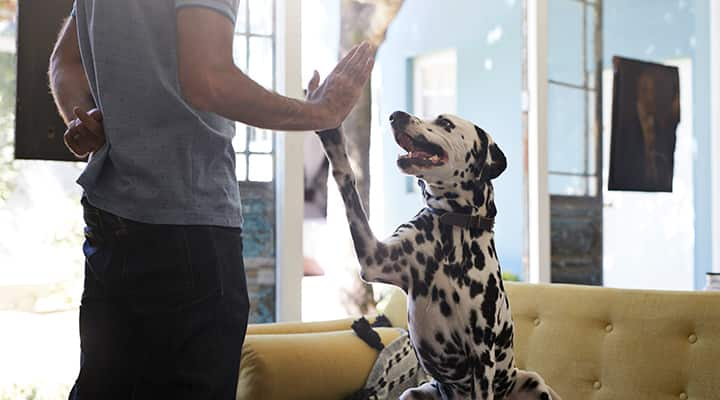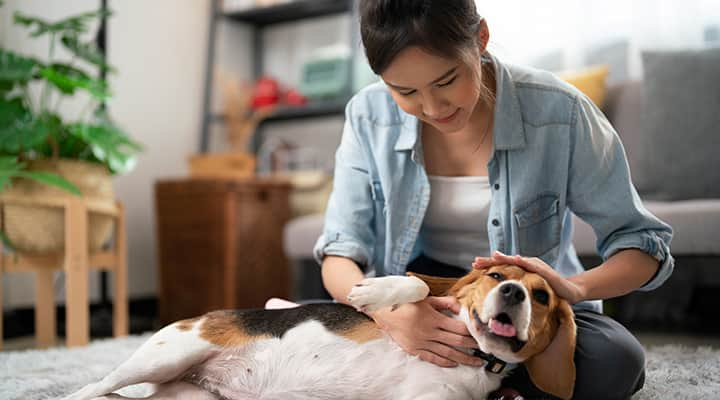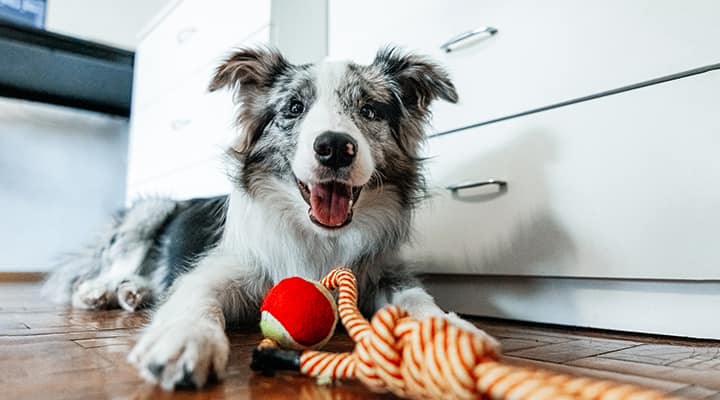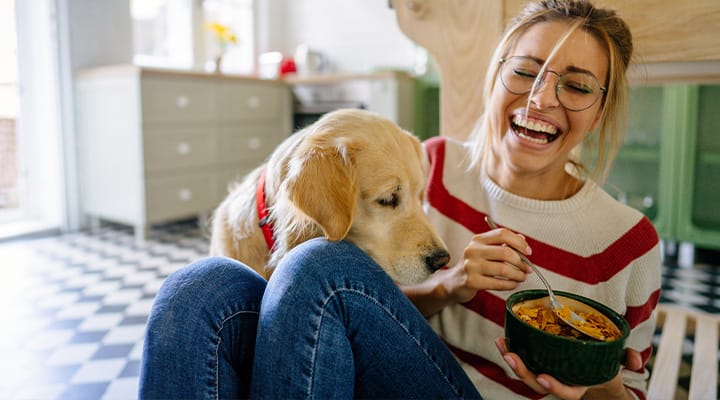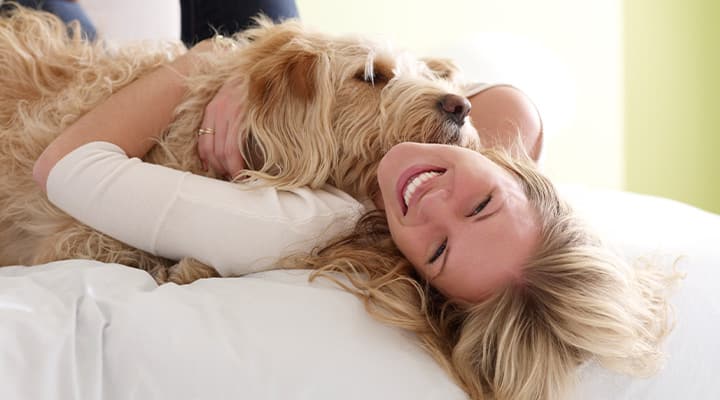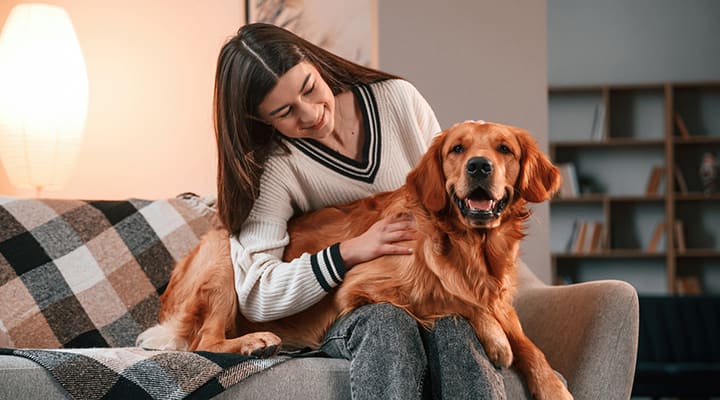
Calming Chews for Dogs: Help Your Furry Friend Relax
Published: November 2023
Be honest: is anyone as excited to see you after a long day as your dog—wagging tail, smiling eyes, wet nose kisses and all? But as anyone who's come home to chewed-up shoes, torn furniture, or trashcan contents spilled all over the living room can attest, the flip side of that joy is that when you're away from home, your fur-baby is not a happy pup.
And it's not just being home alone that can impact your dog's stress response and behavior: it's vet visits, nail clippers, car rides, or loud noises like fireworks and vacuums. Why is that? Like us, our dogs can experience uneasiness when facing scenarios that trigger their stress response.
Of course, lots of love and cuddles help reassure them that they are safe, but what to do when you're not home? Many pet parents turn to calming chews for dogs—so do they work?
Here's the scoop.
What are calming chews for dogs?
Calming chews are dietary supplements for dogs that deliver ingredients thought to work with your dog's biological pathways associated with their stress response. Generally, calming soft chews will feature one or both of these ingredients:
L-theanine
: Theanine (or L-theanine) is an amino acid found in green tea; it's what gives your midday drink its calming properties. L-theanine can work within the central nervous system and inhibit excitatory neurotransmitters (the ones that say, "let's stay active!"), which may help your furry friend relax and cope better with their stress response. That does not mean you should share your green tea with your dog: caffeine and canines are not a match. But pets can still harness the soothing properties of L-theanine with a supplement. Look for calming soft chews that use small and controlled amounts of L-theanine to support dogs' healthy stress response.Melatonin
: You may know melatonin as the go-to supplement to support sleep, but some veterinarians see melatonin as beneficial for supporting a healthy response to stress in dogs. That's because it also appears to work within the central nervous system to take the edge off your pooch's response to stress, helping them stay calm and relaxed.
Pro tip: Calming soft chews should complement proper training and socialization for dogs. They are not a substitute. Dogs (of all ages, breeds and sizes) should be exposed to different scenarios, whether at the dog park with other dogs, or at coffee shops with strangers, to take the novelty out of these situations so that they are not reacting out of fear. And of course, keep up with regular vet visits to ensure you're meeting your dog's health needs.
How can I choose an ideal dog health supplement?
Choose a high-quality formula that's scientifically targeted to address your dog's health needs. Here are a few tips to help you choose the best health supplement for your furry family member:
- Avoid artificial flavors and colors
- Choose clinically validated ingredients
- Use dosages appropriate for your dog's weight
- Avoid cheap fillers, such as soy, grain, and gluten
- Stick with a science-based manufacturer known for top-quality products
- Select soft chews since dogs don't like swallowing capsules
Why does my dog react to stressful events?
As is the case with humans, a dog's stress response isn't the bad guy; it's their built-in survival mechanism designed to get them through life-threatening scenarios. Yes, it's that nervous energy that can make your sweet pup act out like a destructive troll—and of course, the vacuum is hardly a large predator. But it's difficult to explain to your dog that a vacuum (or fireworks) will not eat them. If it's any comfort, know that these oversized reactions are what would keep your dog safe should they actually come nose to nose with a real predator versus one that sucks up the dirt from your rug.
Fortunately, because the bond dogs can have with their human caretakers is similar to the bond children have with their parents, our reassurance can help them feel safe when loud noises or being left behind takes them out of their comfort zone.
And just as supplements that support a healthy stress response for humans can get us through uneasy feelings, calming chews can help our canines keep an even keel.
When should I give my dog calming supplements?
If you're considering ways to help your dog be calm and relaxed in situations that would otherwise rattle them, a dietary health supplement (preferably as a soft chew) that helps them manage their response to stress is an excellent option. You can always speak with your veterinarian if you're unsure if calming supplements are right for your pooch.
Once you find calming chews that are right for them, follow the feeding instructions on the label closely. As with many supplements you take, dietary supplements for dogs should be taken daily to ensure maximum benefits in supporting a healthy stress response. How long does a calming supplement last? Every dog is different, so how long the calming support lasts will vary for every dog based on their breed, size and other specific needs.
6 tips and tricks to help your furry friend stay calm
When our furry companions need a little extra help managing their stress response, calming health supplements can help, but there are also a few things you can do at home to keep your pupper calm when stress comes knocking on their door.
Play it cool
Dogs are social animals who see you as their "alpha." As the leader of the pack, you must set an example and stay calm when preparing to leave. If you act frantic or rushed as you're scrambling to find your keys or where you left your lunch bag, your pooch can pick up on that nervous energy.
Crate training
This is like teaching your dog to have their own "safe space," where they can retreat when your absence, fireworks or other loud noises overwhelm them. Crate training takes time and patience. Don't just lock them in it; gradually teach them it's safe and not a punishment. Pro tip: Make it cozy! Add a plush blanket or bed, their favorite toys and homemade treats to get them used to the crate as they learn to enjoy spending time alone.
An active dog is a happy dog
Regular exercise encourages your dog to expend energy in a fun and playful way. By burning all the pent-up energy, your pet is more likely to stay calm and navigate through the uncomfortable feelings they may experience when you leave or when the package delivery truck is approaching your mailbox.
Teach them independence
This is part of proper training and discipline. If you encourage overly clingy behavior, you're doing your dog a disservice. Teaching your pooch to be on their own, even when you are home, is an excellent way to help manage attachment. You can speak with your vet to design a behavioral plan that fosters a calm and self-sufficient dog.
Give them something that smells like you
Dogs respond to familiar smells. You can help your pooch deal with spending time alone by giving them a worn sweater or a blanket that smells like you. Remember, you are their entire world, so your scent is the ultimate comfort item when you're away.
Explain why you're leaving
Headed off to work and plan to be back at night? Tell your dog! Will you miss them but know they will have a fun, relaxing day at home? Say those exact words. If talking to a dog sounds off to you, hear us out! We know canine intelligence varies from dog to dog, but their mental and emotional state is often compared to human toddlers. This means that while they may not understand the context, they can pick up on your body language and the energy behind what you're saying. So even if you feel silly, make the effort. It could mean the difference between coming home to a zen pooch versus stuffing scattered throughout the house.
References
- Cavanagh K. "Plumb's Veterinary Drug Handbook. Pocket — 7th edition." Can Vet J. December 2012. https://www.ncbi.nlm.nih.gov/pmc/articles/PMC3500119/
- Mariti C, et al. "Effects of Petting Before a Brief Separation from the Owner on Dog Behavior and Physiology: A Pilot Study." Journal of Veterinary Behavior. October 2018. https://www.sciencedirect.com/science/article/abs/pii/S1558787817302502
- Riggio C, et al. "Physiological Indicators of Acute and Chronic Stress in Securely and Insecurely Attached Dogs Undergoing a Strange Situation Procedure (SSP): Preliminary Results." Vet. Sci. September 2022. https://www.mdpi.com/2306-7381/9/10/519
- Reisen J. "Melatonin for Dogs: Uses, Benefits and Dosage." American Kennel Club. October 2023. https://www.akc.org/expert-advice/health/melatonin-for-dogs-uses-benefits-and-dosage/
- Shin Y-J and Shin N-S. "Evaluation of Effects of Olfactory and Auditory Stimulation on Separation Anxiety by Salivary Cortisol Measurements in Dogs." J Vet Sci. June 2016. https://www.ncbi.nlm.nih.gov/pmc/articles/PMC4921663/
- Wang L, et al. "How Does the Tea L-Theanine Buffers Stress and Anxiety." Food Science and Human Wellness. May 2022. https://www.sciencedirect.com/science/article/pii/S2213453021001324
- Weir M and Buzhardt L. "Signs Your Dog Is Stressed and How to Relieve It." VCA Animal Hospitals. https://vcahospitals.com/know-your-pet/signs-your-dog-is-stressed-and-how-to-relieve-it
- "Smarter Than You Think: Renowned Canine Researcher Puts Dogs' Intelligence on Par with 2-Year-Old Human." American Psychological Association. 2009. https://www.apa.org/news/press/releases/2009/08/dogs-think
Like what you read?
Please subscribe to get email updates on this blog.

